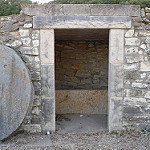It is the most important–and controversial–event in history.
This incident has changed the lives of millions, yet others pay it little attention.
This is the last of a STEPS Journey Blog series that examines four questions critical to how we form our worldview. We have talked about the Bible, God, and who Jesus is.

 Now, we will talk about how Jesus died. And, incredibly, how he then lived again.
Now, we will talk about how Jesus died. And, incredibly, how he then lived again.
You can use your mind and your heart to move toward God. You do not have to set aside your intellect, or your questions, to believe.
You simply have to be committed to a search for truth.
What About the Resurrection?
The most startling event in human history, the resurrection of Jesus, is a proven fact:
New Testament books were written soon enough after the events they recorded to be historically accurate. Most books in the New Testament were written during the period from A.D. 50 to 95. Many people who were alive at the time of Christ would have still been alive when these books were written. If anything in the writings were wrong, including the story of the resurrection, they would have cried out publicly to that effect. But the writings withstood all scrutiny.
Christ predicted his own resurrection and other events proved it. Jesus told his disciples of his coming death and that he would be raised from the dead. If the tomb had not been empty, the disciples could not have maintained that lie for even a single day since there were so many hostile witnesses around. The success of the early church, based on the preaching of the disciples, is also evidence that Jesus arose from the grave.
Jesus appeared in public many times with many people after his resurrection. Acts 1:3 states, “After his suffering, he showed himself to these men and gave many convincing proofs that he was alive. He appeared to them over a period of forty days.” Peter said, “We were eyewitnesses of his majesty.” Writing about A.D. 56, Paul says that more than 500 people witnessed the resurrected Christ at one time, and most of them would have been living when Paul wrote that account. Over a period of time, hundreds of witnesses saw Jesus alive and personally interacted with him.

 The disciples were eyewitnesses of the resurrection, and most of them were killed proclaiming that truth. When Jesus died, the disciples scattered in fear. After the resurrection, these heartbroken followers suddenly turned into courageous witnesses and martyrs. They knew for sure what had happened, and almost all of them were tortured and killed for proclaiming that Christ rose from the dead. People die for causes they believe in but they do not die for a lie, and the disciples knew the truth. They claimed to have seen Christ after he arose. They were willing to die rather than deny that truth.
The disciples were eyewitnesses of the resurrection, and most of them were killed proclaiming that truth. When Jesus died, the disciples scattered in fear. After the resurrection, these heartbroken followers suddenly turned into courageous witnesses and martyrs. They knew for sure what had happened, and almost all of them were tortured and killed for proclaiming that Christ rose from the dead. People die for causes they believe in but they do not die for a lie, and the disciples knew the truth. They claimed to have seen Christ after he arose. They were willing to die rather than deny that truth.
There is no plausible explanation for the resurrection other than it occurred as written in the Bible. Frank Morrison, an agnostic journalist, attempted to write a book refuting the resurrection of Christ. After investigation, his opinions changed and he became a believer in Jesus Christ. Similar transformations have happened involving many people who chose to explore the facts about Jesus.
The death and resurrection of Jesus is one of the most well documented events in ancient history. Professor Thomas Arnold, who was a Chair of Modern History at Oxford, and many other scholars have studied the resurrection events exhaustively and concluded that the evidence for Christ dying and rising again is irrefutable.
You just know. If you sincerely and openly search for truth, you will find it. If you want to search for God, the best way is to get to know Jesus. At some point, your heart, mind, and soul will come to the same conclusion. It will require a step of faith, but once you believe, the Holy Spirit will confirm this truth in you over and over.
A Search for Truth
Some people believe the Bible is a collection of fables, God is a myth, and Jesus was perhaps a wise historical figure. And none of that affects their worldview very much.
You don’t have that choice any more.
If you are engaged in a search for truth, you will eventually come up against a life-changing realization that confronted me in my late thirties. If all this is true, if the Bible is believable, God is real, Jesus is God, and he came to earth to live and die to save us, doesn’t that change everything?
Doesn’t that change everything?
The Gospel refers to the story and teaching of Jesus Christ. Interestingly, over time, the term “Gospel” has also come to mean “something accepted as unquestionably true.”
The word “Gospel” also translates to mean “good news.” The Gospel–Jesus Christ is God, and he died so we could be saved–is the truth. And it is also the best news we could ever receive.
What is your worldview? Is it still being shaped by your search for truth?
The truth is out there, and you can find it. And, yes, it will change everything!
Question: Where are you in your search for truth?
Action: Re-read this four-part Next Right STEPS Blog series end-to-end starting with Part 1.
Photo by tillwe  Photo by kodi_tanner
Photo by kodi_tanner  Photo by paurian
Photo by paurian  Photo by istolethetv
Photo by istolethetv  Photo by Donspic
Photo by Donspic 

